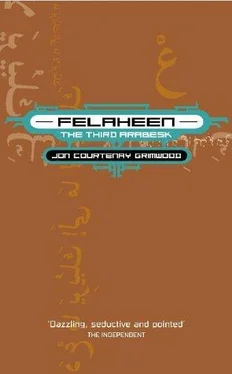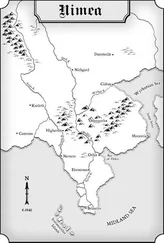"What was clear?" Hani asked.
"Knowing what to do . . ."
"And were you allowed to do it?"
They sat together until Murad was so desperate for a pee that he could sit still no longer. Hani didn't tell him she also needed the loo. Some things were still private for girls.
"Use the basin," Hani said . . . "Now rinse it out," she suggested afterwards.
Murad and Hani then had a brief discussion about whether or not to bolt their door from inside. Hani won and the bolt was left open. Darkness arrived long before someone finally slid a key into the lock.
"We have to get them in here," Hani said.
"What? We're not going to . . ."
"No," said Hani. "I've already told you, I just need them to myself for a few minutes. We . . ." she amended. "We need them."
"Why?"
"Because we do," Hani announced firmly and together they crawled into a narrow space previously occupied by a suitcase.
"Who moved that?" The voice was Midwestern American and female, puzzled rather than angry. Hani didn't care who the voice belonged to, she liked them already. "Carl, Carl . . ." The admonition was addressed to thin air. It had to be, because only one pair of legs could be seen in the room.
White plastic sandals shuffled over to the wall, the case rose from the floor and then it was being tipped on its side and pushed towards Murad.
He grunted.
That was what they'd agreed on, a simple grunt. Now came the dangerous bit when the cabin's owner might shout or rush out into the coach and demand help. They'd decided how to handle this too.
Hani whimpered.
"Who's there?"
The case pulled back, tipped upright.
"Come out," the woman demanded. "Come out right now."
Murad crawled from under the bunk and scrambled to his feet. His eyes were lowered and his shoulders slumped. Inside his head he was trying to remember how Hani had suggested he should shuffle his shoes.
"Oh great. A thief." The woman sounded exasperated. "I suppose you've already pocketed all our stuff." Her glance took in the whole cabin, all five paces of it and found nothing missing. "Maybe not," she admitted, "but then what are you doing here? And what happened to your face?" She took Murad's chin in her fingers and turned his head to the light, tutting as she did so. "Someone hit you?"
When the boy stayed silent, Micki Vanhoffer sighed. She was a large, home-loving woman very far from Ohio. Doing what her husband thought she should be doing, taking a break from comfortable cruises around the Caribbean. A month in North Africa was his idea. Well, and her eldest son's, Carl Junior. An anniversary present supposedly. So here she was on a glorified bus in the middle of a heat wave, in March for heaven's sakes.
"I'd better tell the driver," Micki said mostly to herself, reaching for the door handle. "And then we can call your parents."
"He doesn't have any," said Hani, rolling out from under the bunk in a tumble of arms and legs. After scrambling upright, she took Murad's hand and gripped hard when he tried to pull away. "We're orphans," she added quickly. "From an orphanage. A cruel place."
Huge black eyes looked up at Micki Vanhoffer from beneath a rather dirty scarf. Eyes that swam so deep with tears they appeared larger than was humanly possible. Below those eyes jutted a nose too prominent to fit any Western idea of beauty and under this a mouth that positively quivered with anguish.
"You speak English . . ." Micki meant it as a statement rather than a question, but her words were inflected, rising towards the end so Hani found herself answering.
"Yes," Hani said. "I learnt it from tourists. When I was working in a café with my mother."
Micki looked puzzled. "I thought you said you lived in an orphanage?"
"This was before my mother died," Hani said firmly. "When I was little."
"When you were . . ." The large woman looked at the small girl and sighed. "Things like this never happen on cruises," she said. "I'll get Carl Senior down from the bubble. You wait here."
"You say he's your brother . . ."
Hani looked at Murad, then nodded. "My brother," she agreed. "Unfortunately he's not very bright."
The man asking Hani questions was big in a different way. His shoulders so broad that they seemed to stretch against his very skin. On his T-shirt was a simple fish made from a single line that curled back over itself at the tail; Hani had a feeling she'd seen the sign before.
"You have the fish."
The man nodded. "You know what it means?"
Hani nodded. "Of course I know," she said. "Everyone knows."
"Carl . . ." The word was a warning. "I know you want to do good in this heathen place but remember what our brochure said about preaching."
"I'm not preaching," said the man. "She mentioned it first." He dropped to a crouch in front of Hani. "What's this about an orphanage?" The words were soft, unlike his eyes, which were pale, watchful and just a touch angry. Mentioning his shirt had obviously been a bad move.
"We're running away," said Hani.
"I can see that."
"From an orphanage."
"What's its name? Come on," he said when Hani hesitated. "Spit it out."
Hani looked puzzled. "Spit what out?" she said.
"Carl!"
"It's a fair question," Carl Vanhoffer said to his wife. "If she can't instantly name the orphanage, then it probably doesn't exist. And that boy isn't her brother. Not full brother anyway. The skin colours are way different."
"You'll have to excuse Carl Senior," said the woman with a tight smile. "He used to be a police officer. He gets like this sometimes. You should have seen him with Carl Junior when he was growing up . . ."
"That's okay," said Hani. "My uncle used to be a policeman. He gets like that too and your husband's right. We're not really running away from an orphanage."
"Told you," Carl Vanhoffer said. "What are you running away from?"
"Marriage," said Hani and slowly pulled the shawl tight round her face, shrinking inside it. With her hunched shoulders and narrow back she looked frighteningly young. "And you're right about the other thing too, Muri's not my brother, he's my cousin."
"How old are you?" That was the woman.
Hani thought about it.
"Well?" The man's eyes were less hard than they had been. Slightly mistrustful to be true enough but not out-and-out disbelieving.
"Twelve," said Hani, adding a year to her age. Assuming Khartoum was right and she really had just turned eleven.
"You don't look it."
"Carl!" Again that outrage, almost maternal. Like there were things men couldn't be relied on to understand. Hani glanced at the both of them, the American man and woman. Most husbands and wives she'd met had harder edges to their lives and stricter boundaries. However, Hani had to admit to not having met many.
Hamzah Effendi and Madame Rahina were not a good model. Aunt Jalila and Uncle Mushin even worse. One now dead, the other apparently in a sanatorium. Uncle Ashraf and Zara? They weren't even a couple, not properly.
"It's all to do with food," Hani told the woman. "The less you get to eat the smaller you look . . . A doctor told me," she added, before Carl Senior had a chance to ask her how she knew.
"And the poor get married younger," said the woman.
Hani wasn't convinced this was true because, the way Zara told it, the really poor people in Iskandryia couldn't afford to get married until their twenties, which might be why they got so cross. And that fact probably applied to Ifriqiya as well.
But Hani kept her silence.
Despite what Uncle Ashraf, Zara and everyone else thought, she always had known when to keep her opinions to herself.
"Have you met the boy you're meant to marry?"
"Oh yes." Hani nodded.
"What's he like?" The woman sounded interested. Appalled, but still interested.
Читать дальше












